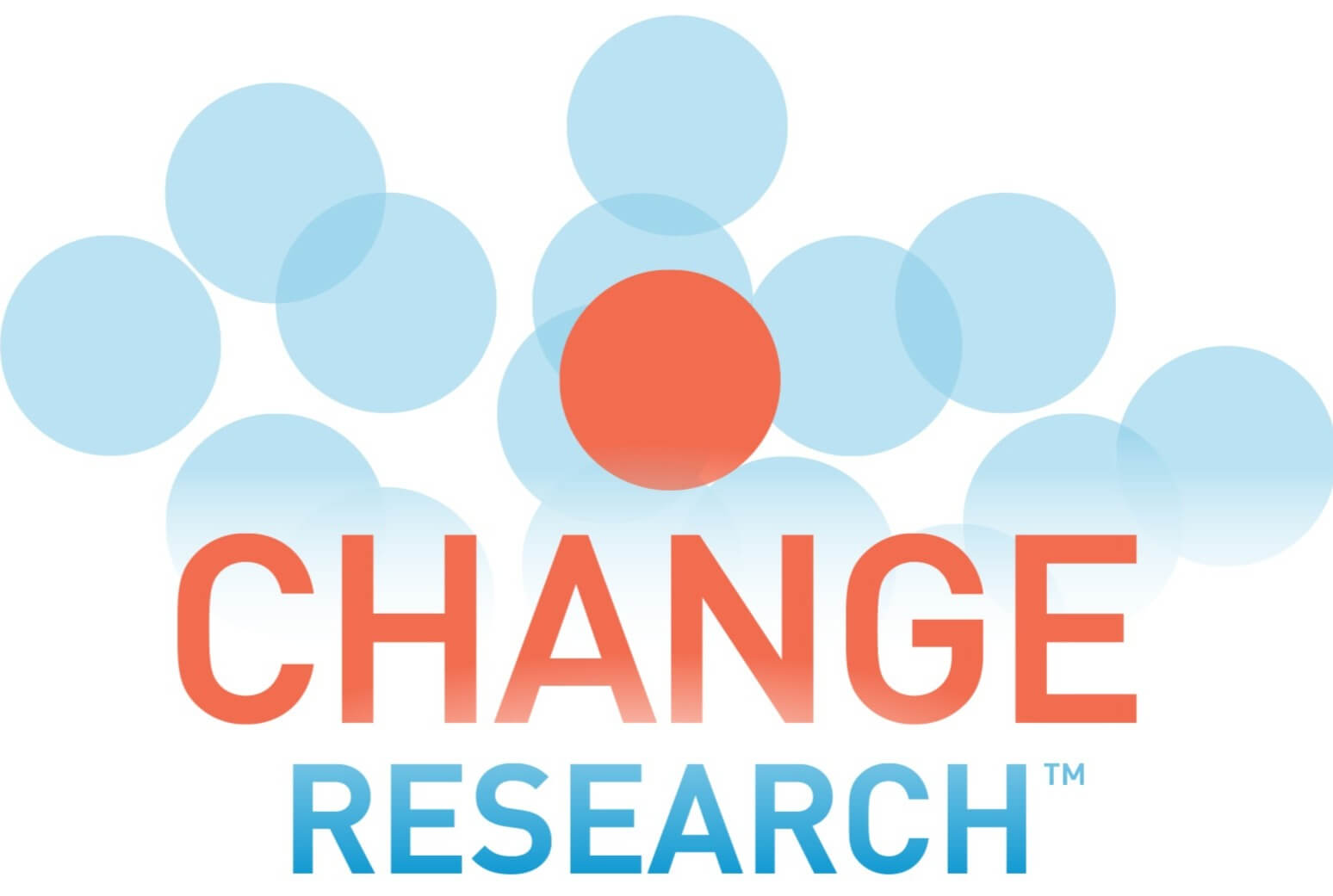Change Research/ CNBC Poll: June 26-28, 2020
Key Takeaways
- Biden leads Trump 49 to 41 among likely voters nationally, and he leads by 6 points in the battleground (50 to 44), up 3 points over the last two weeks.
- For the first time since early April a majority say that things are getting worse when it comes to COVID-19.
- Voters are increasingly taking precautions like wearing masks and avoiding crowds, particularly in Sunbelt States where 53% of voters say things are reopening too quickly.
- Approval of Trump’s COVID response has never been lower in the battleground and nationally, and GOP governors get negative marks while majorities approve of how the Democratic governors are handling COVID-19
- Majorities of voters believe that Trump is doing things that contribute to the recent uptick of COVID-19 cases.
Biden’s lead in the battleground states is growing
Biden leads by 8 points nationally (49% Biden, 41% Trump) and his lead across the battleground has doubled from 3 to 6 points (50% Biden, 44% Trump). Biden is ahead in all six battleground states and is winning at least half of the vote in every state except for Michigan.
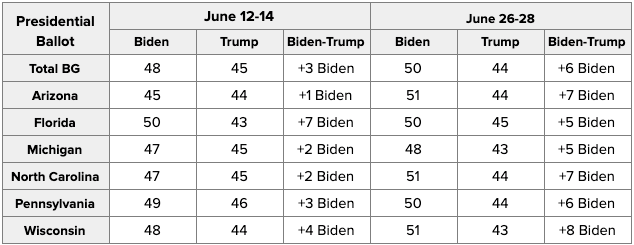
Only 43% of voters nationally approve of Trump’s overall job performance, unchanged from the low point we measured in our last wave, and strong approval is at a new record low of 33%, down two points. A record low of 46% approve of Trump’s job performance in the battleground, and the intensity gap between strong supporters and opponents has widened to 35% strongly approve, 51% strongly disapprove.
Approval of Trump’s handling of the coronavirus outbreak is also at a record low, down further from the last wave. Only 43% of battleground voters and only 41% of voters nationally approve of his handling of COVID-19 now, down 2 points and 1 point since mid-June, respectively. When it comes to strong approval, the shift is even more stark: only 27% of voters in the battleground strongly approve, down 5 points since mid-June, and only 25% of voters nationally strongly approve, down 4 points.
Negative reviews of Trump’s handling of other issues grew as well. Only 38% of voters nationally and 42% of voters in the battleground approve of the job he is doing ‘Bringing our country together in times of national crisis’ – down 3 points over the last two weeks. When it comes to ‘Making America respected around the globe’ just 41% of voters nationally and 44% of battleground voters approve of the job he is doing – down 2 points nationally and down 3 points in the battleground over the past two weeks. The issues that pundits believe Trump should turn to in order to revive his poll numbers are also not strong points for him in this survey:
- Immigration – only 42% of voters nationally and 46% of battleground voters approve;
- Helping your pocketbook and the economy – only 46% of voters nationally and 48% of voters in the battleground approve;
- The stock market – only 48% of voters nationally and 50% in the battleground approve.
COVID-19 is increasingly important as cases tick up
Across the country and the competitive battleground states, concerns about COVID-19 are up and assessments of our progress against this pandemic are negative once again.
The number reporting very serious concerns is now 49% (+10 since our last wave) in the battleground and 52% nationally (+12 since our last wave). Concerns are greatest in the states that are being hit hardest by COVID-19 in our battleground – Arizona and Florida: 56% in Arizona and 54% in Florida have very serious concerns about COVID-19 now. The increase in serious concerns was greatest with Republicans (+10 more serious concerns) in the battleground.
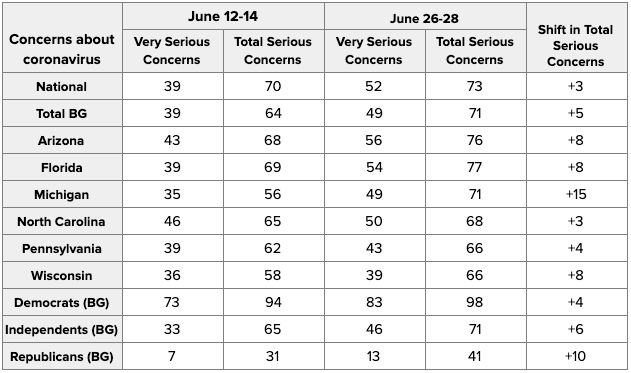
Majorities nationally (58%) and in the battleground (55%) now say that when it comes to the impact of COVID-19, things are getting worse, up double-digits from two weeks ago (+18 nationally, +14 in the battleground). The last time voters were this pessimistic was in April. Voters in Arizona, Florida, and North Carolina – the states struggling most in the battleground right now – are especially likely to say things are getting worse.
After being the fourth most important issue facing the country in our last poll, COVID-19 is now the second most important issue in the battleground after the economy, jobs, and cost of living, and is tied for second with health care costs in our national poll.
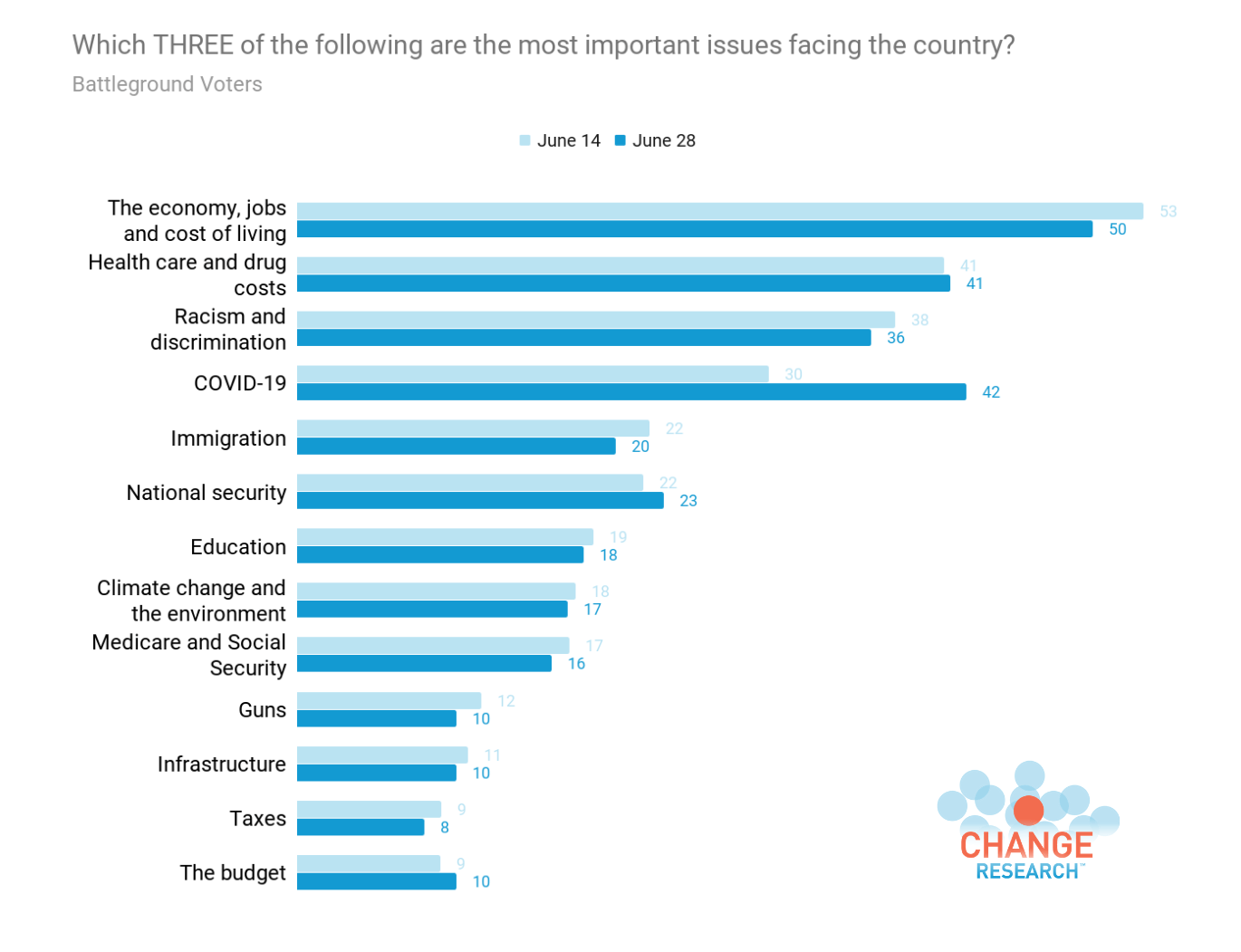
Voters are changing course on reopening and increasingly taking precautions again
Last wave we saw a 4 point increase nationally and 5 point increase across the battleground in the number saying that things are reopening too quickly. That increased another 5 points nationally and another 6 points in the battleground over the past two weeks. The shift is driven by the Sunbelt states currently experiencing the highest cases – 53% of voters in the Sunbelt states say things are reopening too quickly (23% at the right pace, 24% not quickly enough). By comparison, 30% of those in the Rust Belt say things are opening too quickly (34% at the right pace, 36% not quickly enough). Even 47% of voters in households that lost wages or jobs due to COVID-19 nationally now say that things are reopening too quickly.
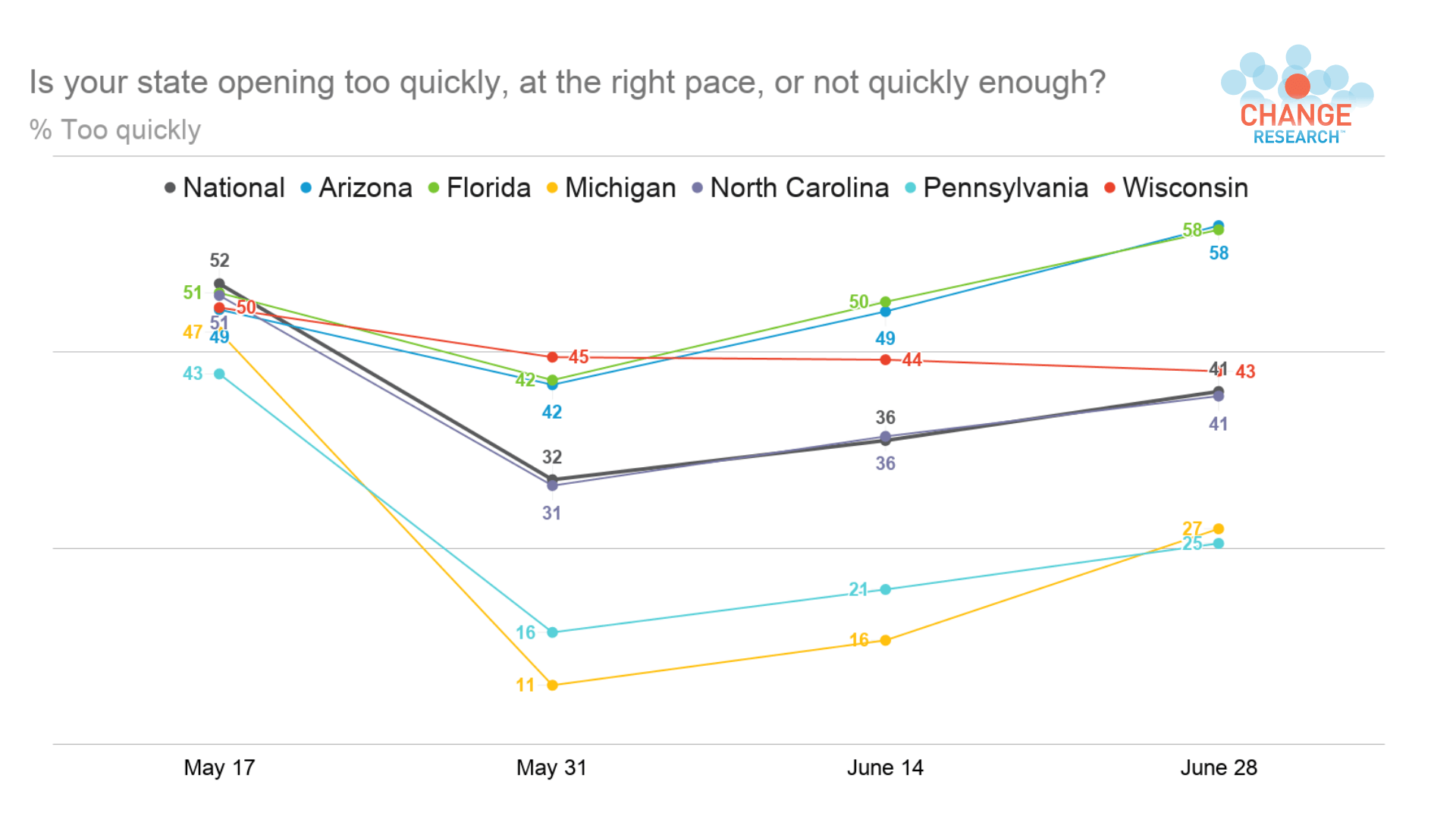
More voters are reporting taking precautions to protect themselves from COVID-19. The two things that people are increasingly doing the most are avoiding crowds (from 74% to 79% participating in the battleground) and wearing masks in public (from 68% to 75% participation in the battleground). Mask wearing is highest among people of color, 18 to 34 year olds and seniors, women, and college graduates, but even half of those who support Trump in the battleground states are now wearing masks in public.
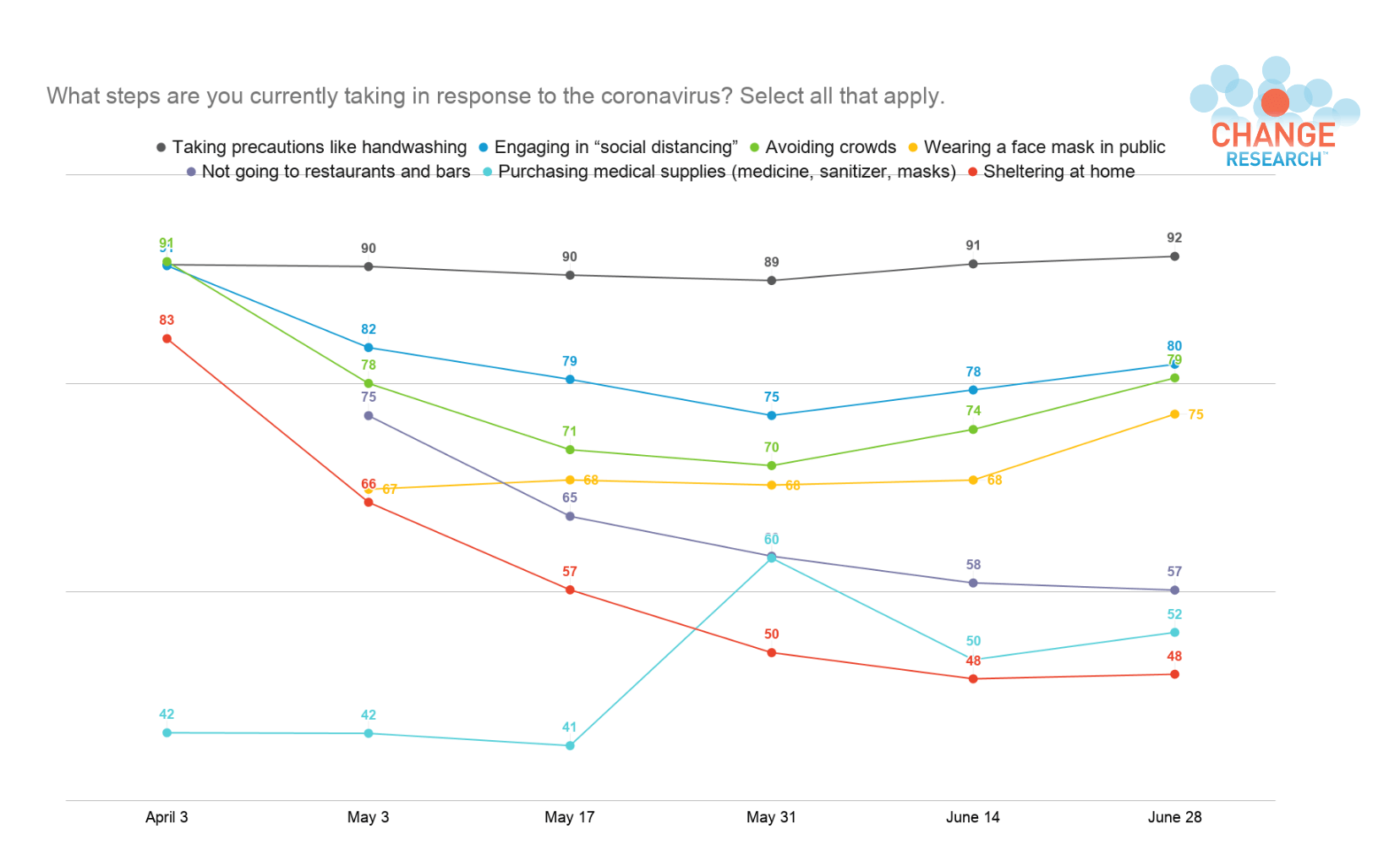
The increase in precaution-taking is driven by the Sunbelt states experiencing the new highs in COVID cases:
- 84% of Sunbelt voters are social distancing v. 76% of Rust Belt voters;
- 82% of Sunbelt voters are avoiding crowds v. 75% of Rust Belt voters;
- 77% of Sunbelt voters are wearing masks v. 73% of Rust Belt voters;
- 57% of Sunbelt voters are purchasing medical supplies v. 47% of Rust Belt voters;
- 53% of Sunbelt voters ar shleting at home v. 42% of Rust Belt voters;
- 31% of Sunbelt voters are working from home v. 26% of Rust Belt voters;
In fact, Sunbelt voters are now doing these things at higher rates than the country as a whole.
There have also been decreases in the numbers saying that certain activities are safe in the battleground states. There was a 3 to 8 point decrease in the number saying things were safe across the activities we tested. The largest shifts came in people saying it was safe to go to a bar, go to a public beach, go to a movie theatre, and go to their workplace (8 points fewer say safe).
Presently, majorities in the battleground only say it is safe to do two things: go shopping (56% safe in the battleground, 55% nationally) and go to a hair or nail salon (51% safe in the battleground, 48% safe nationally).
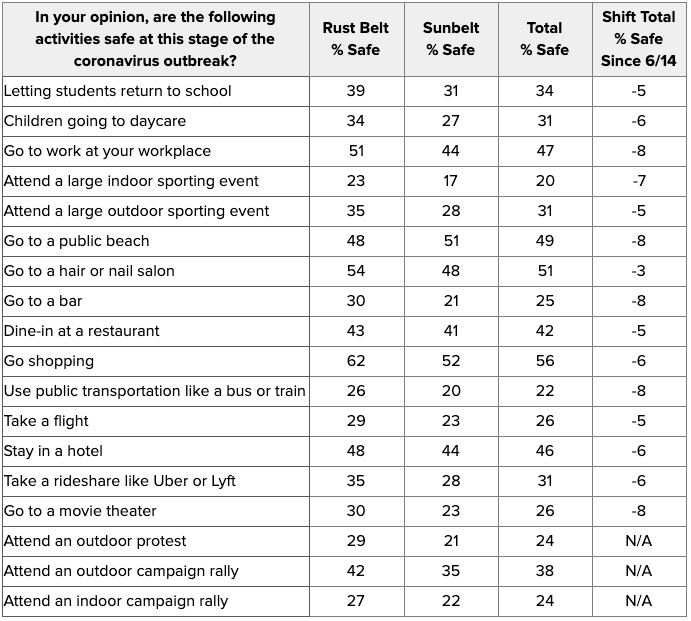
This survey fielded a week after the Trump campaign’s Tulsa rally and roughly 4 weeks after the killing of George Floyd sparked protests. Roughly one-in-four voters say it is safe to attend an outdoor protest (24% in the battleground and nationally). The same number say that it is safe to attend an indoor campaign rally. Voters were more likely to say that it was safe to attend an outdoor campaign rally (38% in the battleground, 36% nationally). The greater concern about a protest compared to indoor and outdoor rallies is driven by GOP voters:
- 72% say it is safe to attend an outdoor campaign rally;
- 52% say it is safe to attend an indoor campaign rally (by comparison, 51% say a movie theatre is safe);
- 34% say it is safe to attend an outdoor protest.
It should be noted that majorities of Republicans in the battleground say that every other activity is safe with the exception of taking a flight, going to a bar (both 49% safe), attending a large indoor sporting event (41%), and taking public transportation (40%) – and all of those were considered safer than attending an outdoor protest. By comparison, there was only a 6 point difference in the number saying that an outdoor protest was safe (15%) and an outdoor campaign rally was safe (9%) among Democrats in these key states. Indeed a majority of Democrats have never said that any of these activities is safe since we started asking this question.
Asked how states currently experiencing an increase in COVID-19 hospitalizations should proceed, the plurality of voters say that those states should increase precautions again (45% nationally, 43% in the battleground, including 44% in the Sunbelt and 41% in the Rust Belt). A little over one-quarter say that reopening should be paused (26% nationally, 27% in the battleground). Only 3-in-10 voters say that we should relax precautions further.

Reopening and Donald Trump
Donald Trump does not just earn his lowest marks for handling COVID-19, he is also the person most blamed for the recent increase in COVID-19 hospitalizations. Four-in-ten voters nationally and 35% of voters in the battleground say Donald Trump is most to blame for the recent increase in hospitalizations. Voters also blame states reopening their economies too soon, people not wearing masks, and people not social distancing.
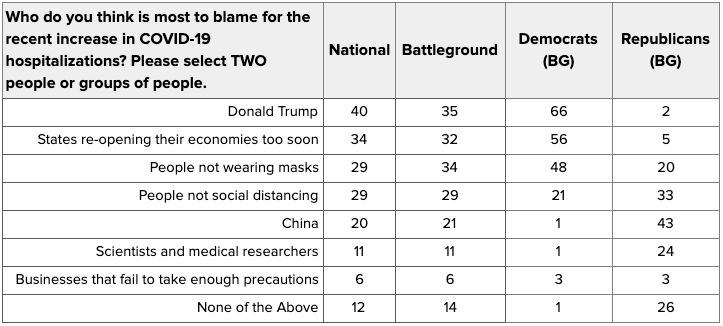
An even greater number of voters believe that Trump is doing things that contribute to the recent uptick:
- 57% nationally and 55% in the battleground agree that “Donald Trump is pushing states to reopen their economies too quickly in order to boost his own re-election chances.”
- 58% nationally and in the battleground agree that “Donald Trump is putting people’s lives at risk by hosting indoor campaign rallies where people cannot socially distance and aren’t required to wear masks.”
- 60% nationally and 57% in the battleground disagree that “Donald Trump is setting a good example and providing accurate information about proper COVID-19 precautions.”
The economy & the inadequate Trump response
A stunning 48% of voters in the battleground and nationally report having lost wages in their household as a result of COVID-19, and almost 80% are still experiencing those wage cuts (77% in the battleground, 78% nationally); 36% of voters in the battleground an 35% nationally say they or someone in their household lost a job or was furloughed, and 75% of those voters in the battleground and 80% of them nationally remain out of a job or on furlough.
So far the Republican Senate and the White House have not expressed support for extending the additional federal unemployment benefits under the CARES Act, with some GOP lawmakers worrying that it will disincentivize returning to work. Not only is that out of touch with the reality voters are still facing, it also does not reflect the concerns of voters who are “more concerned that if we don’t extend the additional $600 a week in unemployment benefits that people who have lost jobs will fall further behind and the recession will get deeper” (56% nationally, 54% in the battleground). Just 44% nationally and 46% in the battleground said they were “more concerned that extending the additional $600 a week in unemployment benefits will be a disincentive to people returning to work because some people may get more money in benefits than they would at their old job.” A significant minority of Republicans (19%) and Trump voters (17%) are more concerned about letting the UI bonus expire.
It’s no wonder that a 57% majority of voters nationally and 55% of voters in the battleground (up from 53% two weeks ago) disagree that “Donald Trump has done enough to help working Americans make it through the current economic downturn.”
The political cost of the GOP’s failure to govern
Majorities approve of the job all of the Democratic Governors are doing handling COVID-19, while majorities now disapprove of the job that DeSantis and Ducey are doing (53% disapprove and 63% disapprove, respectively).
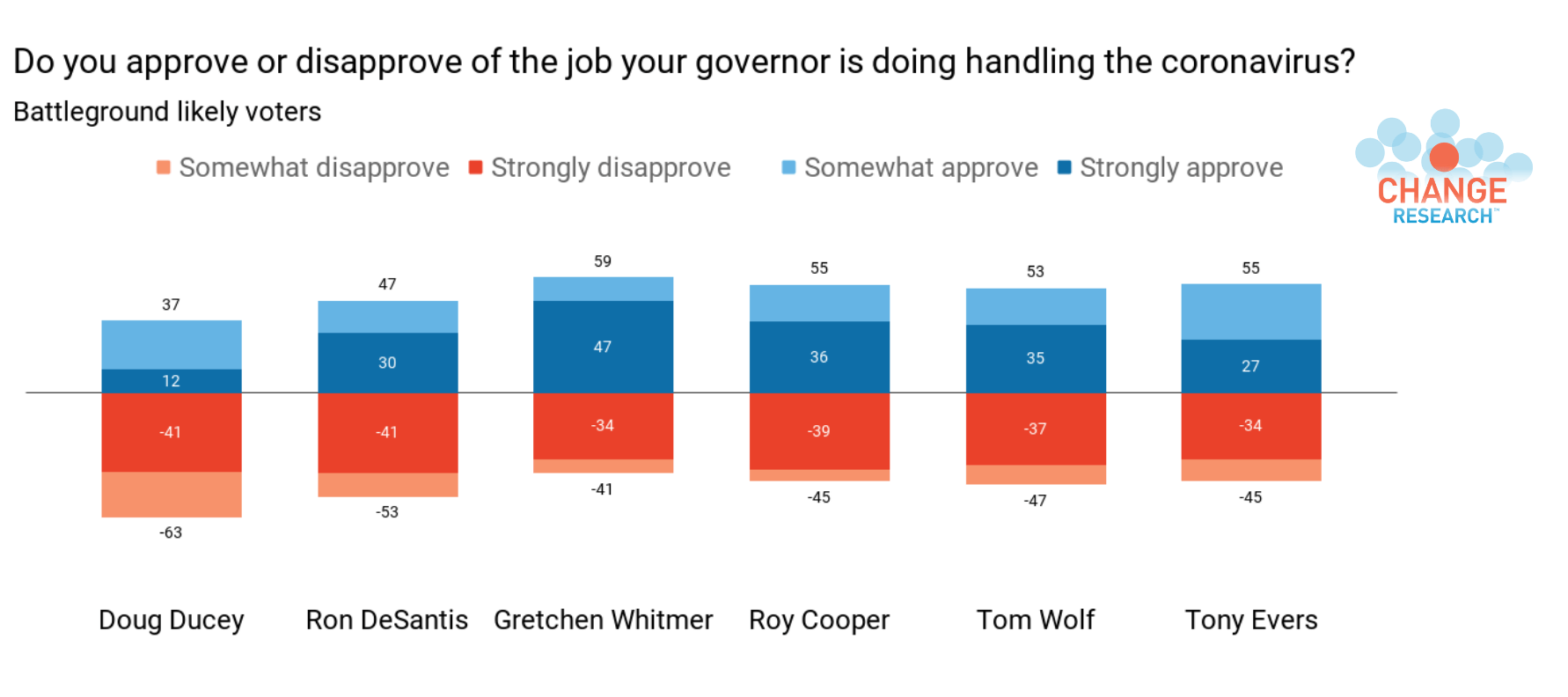
The weak response of Trump and Republicans to COVID-19 is tarnishing the GOP brand and is making things difficult for their chances of holding to the U.S. Senate. In Michigan, Democrat Gary Peters is leading John James by 7 points (49% Peters, 42% James), Democrat Cal Cunningham has a 10-point advantage over Republican Thom Tillis (51% Cunningham, 41% Tillis), and Mark Kelly leads Martha McSally by 9 points.
Battleground Sample & Methodology
National Survey Sample & Methodology
For media inquiries, please email [email protected]
Change Research conducted a poll of 3,739 likely voters June 26-28, 2020 across 6 competitive battleground states: Arizona, Florida, Michigan, North Carolina, Pennsylvania, and Wisconsin. A companion national survey of 1,663 likely voters was also conducted June 26-28, 2020. Unless otherwise stated, the results presented in this analysis are among battleground state voters. The margin of error, as traditionally calculated, is ±1.6% for the battleground and ±2.4% for the national poll. Change Research reaches voters via targeted online ads that point people to an online survey instrument. Our Dynamic Online Sampling establishes and continuously rebalances advertising targets across region, age, gender, race, and partisanship to dynamically deliver large samples that accurately reflect the demographics of a population. Post stratification was done on state, gender, age, race, education, and 2016 presidential vote.
This is the eighth in a series of bi-monthly battleground state and national surveys that CNBC & Change Research will conduct in 2020.
